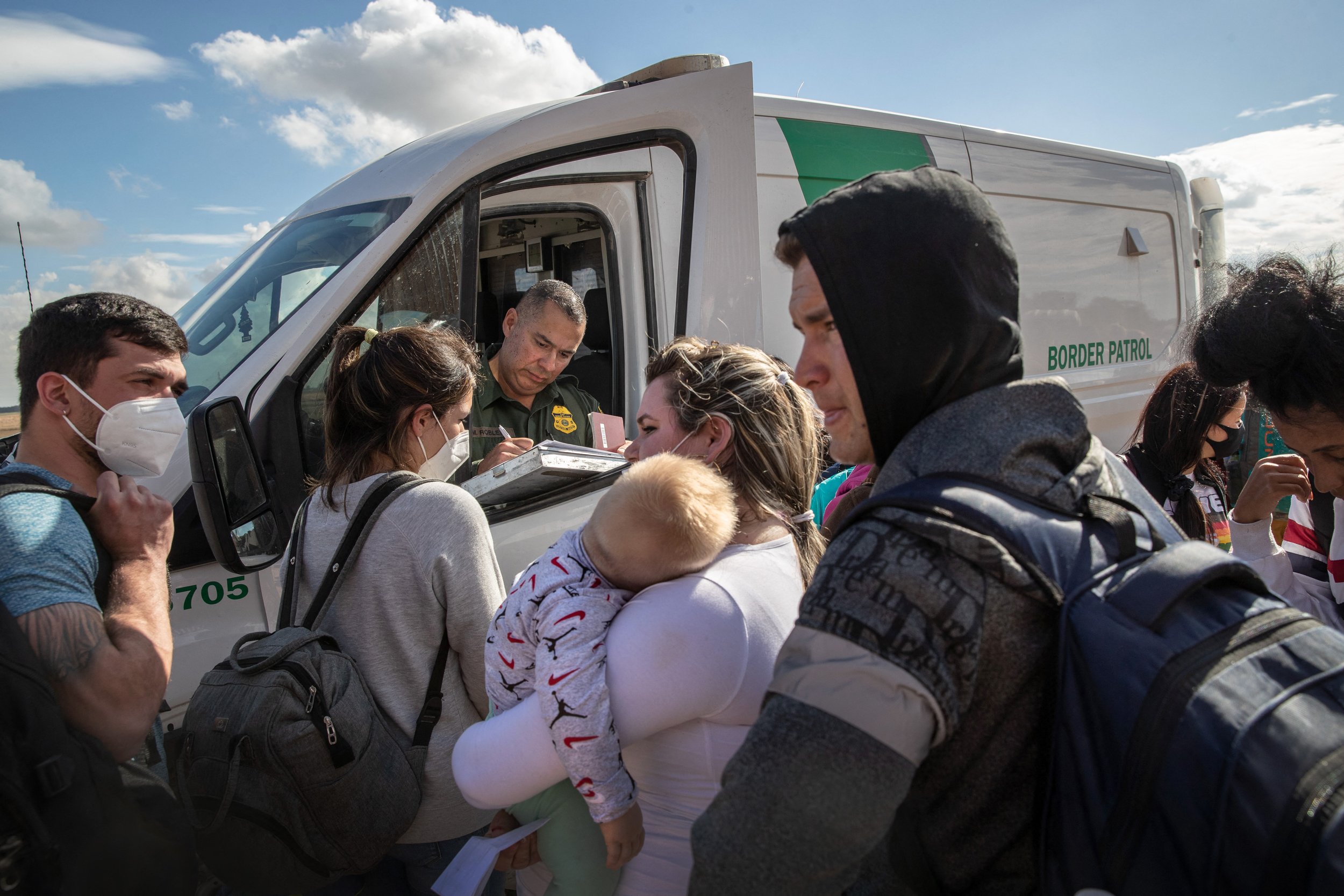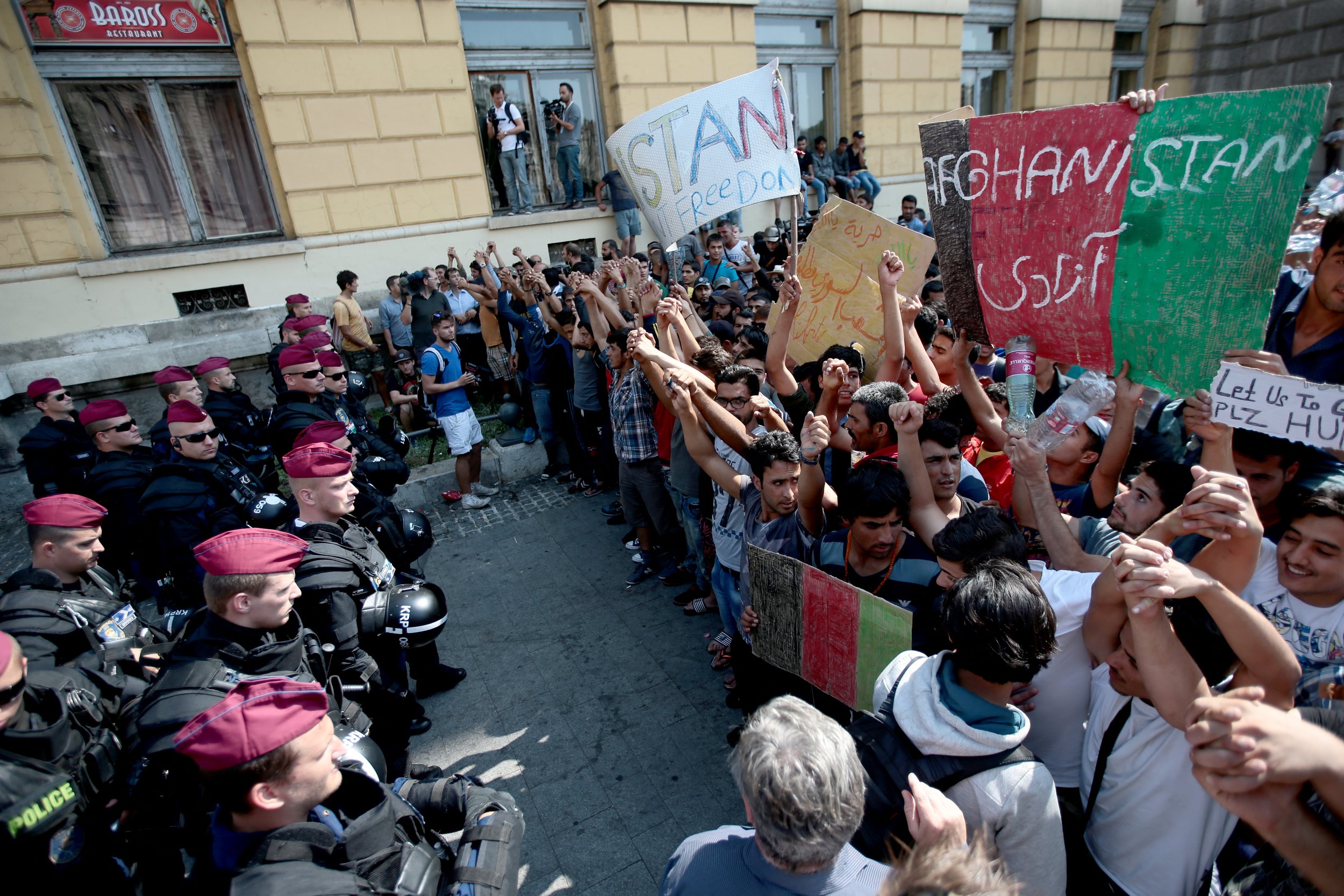In Europe, Not All Refugees Are Equal
Syrian and Afghan refugees face riot police during a protest to demand to travel to Germany on September 2, 2015 in Budapest, Hungary. [Ferenc Isza / AFP]
By Peter Kuras
More than 4 million people have fled Ukraine since Putin’s war began.
It’s the largest refugee crisis in Europe since World War II, but many observers see parallels with a more recent event – the peak of the refugee crisis in 2015 and 2016, when millions of refugees left Syria and went on to enter Germany and the EU.
Andreas Tölke of the Berlin-based NGO Be an Angel spearheaded refugee resettlement in Germany during that period, and has continued to provide a variety of services to displaced people since. I spoke with him recently about the similarities and differences between these two moments, why the German response has “really sucked” and the best ways for citizens to help.
This interview has been edited for length and clarity.
You’re in Moldova at the moment. Can you describe your work there?
We’re trying to be a hub for all the NGOs. There are so many people trying to help right now that there are sometimes situations in which five NGOs go to one camp to deliver food, while in the next camp, nobody has anything to eat.
We're also working with the Moldovan government to evacuate some of the more than 380,000 people who have arrived here from Ukraine. Moldova is a small country and it's the poorest in Europe. A lot of Moldovans took Ukrainian families home, expecting that the war would be over soon. These communities can’t withstand the financial burden of supporting them, so we’re helping get people to Germany and elsewhere in Europe.
Finally, we’re also working with the Ukrainian government. We just set up a project to evacuate vulnerable people and mothers with disabled children. They will be flown to Germany by the United Nations Refugee Agency, and we will work with the German Embassy to guarantee that there will be suitable accommodations for them.
How did your group get involved with refugee resettlement?
We started in 2015. There were so many people arriving in Germany then, mostly from the Arabic world: Syria, Iraq, Iran and Afghanistan. My organization was able to provide more than 1,300 refugees with temporary housing. But we branched out quickly and especially into helping people navigate German bureaucracy. The German system is very complex, and it can be pretty tough for a refugee to understand where to go and what to do.
How does the current refugee crisis compare to the 2015-2016 crisis?
Now, as in 2015, the reaction on the part of European civil society has been amazing. When it comes to rights for the refugees themselves, however, we unfortunately have a two-class system. Everybody has the right to seek refugee status – that right is even inscribed in the German constitution. In 2015 and 2016, for reasons I’ve never understood, those protections were not extended to war refugees.
Instead, all the Syrians coming to Germany had to submit asylum applications, so they were immediately involved in legal cases that sucked up a lot of energy and time. The asylum applications also made it very difficult for refugees to start working and establish new lives. That’s been different for Ukrainians. They do not need to establish residency when they arrive in Germany, nor do they need to apply for asylum. They’re able to start working legally right away.
That certainly seems to confirm the depths of European prejudice against people from the Arab world. What other differences have you noticed?
Right now, a minority of people in Germany are saying that it’s finally the “right” refugees who are coming – that is, only women and children. During the last crisis, it was largely young men. We know why there aren’t many young Ukrainian men coming right now: They are being conscripted into the army and forced to fight. Still, the demographics of this current wave of refugees have led to them being greeted much more warmly.
I really am shocked to see this two-class system developing. It’s been great for refugees from Ukraine, I just wish we had seen the same kind of compassion for refugees from the world.
It seems like even in the current crisis, refugees who are not white are having the hardest time.
Right now, I have a Syrian man staying with me in my office in Moldova. He left Syria eight years ago, traveled to multiple countries and finally ended up in Ukraine on a tourist visa. Because he’s seeking refugee status, he has to claim asylum in the first EU country he enters. If he were to travel on one of our buses and cross the Romanian border into the EU, he would be forced to claim asylum there.
First of all, claiming asylum in Romania is a no-go for a Syrian, and second, although he has relatives in Germany, he can't legally claim family reunification there because he’s an adult. All this goes to show how complicated these situations can be.
Could you say more about the German government’s current response to the refugee crisis?
It has really sucked. It’s especially frustrating to see that Berlin didn't learn much from 2015.
Granted, the number of refugees arriving from Ukraine has been much larger. During 2015, 2016, we had 1,300 people arriving on a daily basis. Now that number is 3,000 a day or more. And it has been the NGOs that have really made the system work. Unfortunately, the Berlin Senate hasn’t been listening to the NGOs. The buses we’re sending from Moldova are only going to government refugee camps in Germany that can prove that they’re able to offer suitable accommodation.
We have had really bad experiences with government refugee camps, either because the accommodations were terrible or because people were given very little food or no help. So, we refuse to rely on government institutions to host refugees unless they can prove that they can take full responsibility for their well-being.
Besides donating money, what can people do to help refugees?
We all have to stand up and raise our voices. We have to tell the world that the right to escape is a human right. For me, it’s personal. I'm Jewish. My grandparents were killed in Auschwitz. If my grandparents had been able to escape from Germany, I could have grown up with a whole family. And the right to grow up in a safe place, with your whole family, is a human right. One that we really have to fight for.




